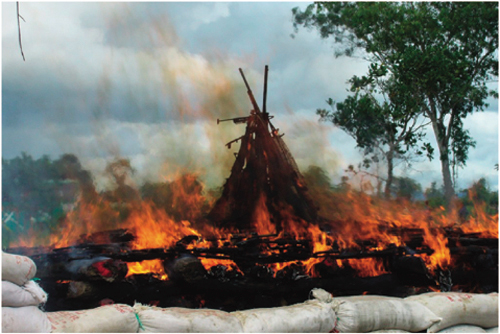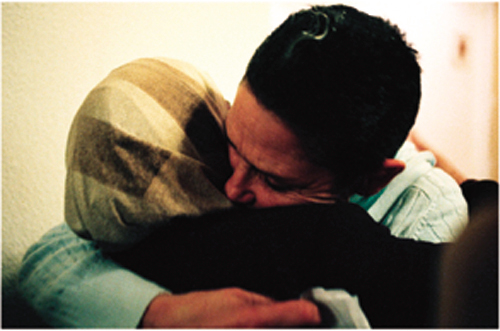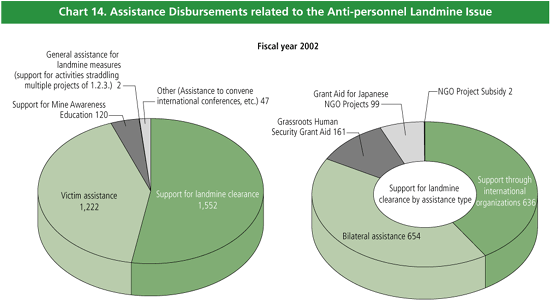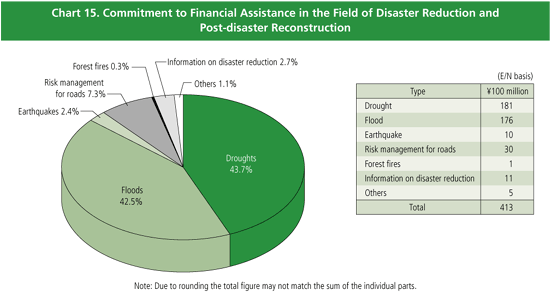
| Part III. |
ODA DISBURSEMENTS IN FISCAL YEAR 2002 |
Chapter 2
Section 1
5. Conflicts, Disasters and Development
(1) Conflict and Development
In July 2000 Japan announced “Action from Japan on ‘Conflict
and Development’,” which provides comprehensive support through ODA
in ways that help alleviate hardship at all stages of the conflict cycle, from
conflict prevention to emergency humanitarian assistance, support for rehabilitation
and reconstruction, prevention of conflict recurrence and full-scale development
aid.
As stated in Part I, Japan intends to strengthen
cooperation for the consolidation of peace and nation building in countries
suffering from conflict. This policy is a pillar of Japan’s international
cooperation. Taking this into account, Japan is providing assistance continuously
in accordance with changing situations, ranging from emergency humanitarian
assistance in conflict situations and assistance to expedite the ending of conflicts,
to “consolidation of peace” and “nation-building” in post-conflict
situations. These efforts are mentioned in the revised ODA Charter in the section
about the priority issue of peace-building.
As a new assistance need, the peace-building sector occupies an increasingly
large percentage of total assistance. Japan is not neglecting the development
of other countries and regions, or development in other sectors. The issue of
how to appropriately implement assistance in a form that meets these various
needs with a limited ODA budget has become extremely important.
Japan’s assistance in this sector in fiscal year 2002, in addition to the
support for Afghanistan and Sri Lanka introduced in
Part I , includes support for nation-building in Cambodia and East Timor—countries
that are undergoing reconstruction from conflict and unrest—and support
for the promotion of peace in Aceh in Indonesia and Mindanao in the Philippines.
In Cambodia, a negative legacy of long years of conflict is the problem of the
large number of small arms and light weapons remaining in the hands of the general
public. Japan is actively supporting the nation-building of Cambodia primarily
through poverty reduction. In addition, in fiscal year 2002 Japan used grant
aid for conflict prevention and peace building to support the “Peace Building
and Comprehensive Small Arms Management Program,” a project which provides
infrastructure development requested by local residents (repair and construction
of roads, wells, bridges, schools, etc.) in exchange for the voluntary surrender
of small arms and light weapons by them, and carries out development of Government
of Cambodia systems to manage and register small arms and light weapons.
The Democratic Republic of Timor-Leste (hereafter referred to as “Timor-Leste”)
achieved independence in May 2002 after enduring many years of suffering. The
stability of Timor-Leste—the newest country in Asia—is extremely important
for the stability of the entire Asian region. Japan is supporting the nation-building
of Timor Leste, which is aimed at development and self-sufficiency. At the Donors’
Meeting for East Timor held in Dili in May 2002 just before independence, Japan
announced that it would provide assistance of up to $60 million over the following
three years and it has been steadily implementing assistance focused on reconstruction
and development.
 |
| Weapons being burned at a weapons destruction ceremony in Cambodia |
| Column 5 |
Support for a Workshop for Reconciliation
attended by Israeli and Palestinian Bereaved Families |
|
Since the outbreak of conflict (the Intifada) in September
2000 a total of 3,428 lives have been lost in Israel and Palestine (829
on the Israeli side, 2,599 on the Palestinian side) (as of November
2003), leading to implant deep distrust and hatred in the two peoples.
Under the circumstances, in fiscal year 2003, Japan commenced assistance
through grassroots human security grant aid for a joint Israeli-Palestinian
project with the aim of promoting trust between the Israeli and Palestinian
peoples based on the concept of human security.
Japan decided to support the “Parents’ Circle-Families Forum,”
a local NGO that has been soberly and honestly working at the person-to-person
level for the peaceful coexistence and mutual reconciliation of the
two peoples. The NGO consists of Israeli and Palestinian bereaved families
who share the painful experience of having lost beloved relatives and
children in the Israeli-Palestinian conflict, and currently it has more
than 500 members. It is primarily engaged in mutual support of the members
and educational activities to advocate the need for peace to prevent
the occurrence of further tragedy. In 2002 it conducted more than 1,600
lectures in high schools in Israel.
With Japan’s assistance (approximately $80,000 provided), a large-scale
workshop was held over two days—January 23–24, 2004—with
the participation of more than 150 bereaved families from both communities.
The entire Seven Arches Hotel in East Jerusalem was booked for the workshop
where group sessions for the bereaved families to talk about past tragedies,
and debates about how to realize reconciliation between Israel and Palestine
and a variety of other discussions were held. In a space secluded from
a world in which “conflict” is a daily fact of life, the members
of the bereaved families on both sides, who would normally be enemies,
spent two days living under the same roof and talking about the past
tragedies of each individual.
One of the participants, Mr. G (a Palestinian) experienced the following
tragic incident. He was out driving with his family when they were ambushed
by Israeli soldiers. His wife and daughter were murdered in front of
him and he was also shot eight times. He said “I do not hate the
Israelis. What I hate is the occupation policy of the Government of
Israel and the current reality that reconciliation cannot be achieved
between the two sides.” Also, Ms. S, an Israeli who lost her daughter
in a suicide bombing, said “Simply because there has been no reconciliation
between the two sides, I lost my daughter. The only way to avoid further
tragedy is to achieve reconciliation between the two.”
The workshop was not limited to providing an opportunity for the participants
to transcend the fact that they were enemies and offering mutual support
to heal the pain shared by all who had tragic experiences of losing
their own parents, brothers, sisters, children, and others. It was also
a first step toward reconciliation between the two communities.
Today, most Israelis have a preconception that Palestinians are terrorists
and most Palestinians think of Israelis as cold-blooded occupiers. The
distrust and hatred that has taken root in the two communities has been
a major factor causing further damage to the already stagnating Middle
East peace process. Projects like that the above to promote trust between
the two communities are valuable and important attempts to achieve stability
in the region.
Interestingly, one of the participating bereaved families made the following
comment. “At the time when Israel was founded (1948), Japan was
still a country devastated by its defeat in war. Half a century later
Japan has become a major economic power while my country is still in
the midst of a futile killing field. Why such a difference!? Assistance
from a country which left hate behind and achieved peace carries a lot
of weight. I think we have a lot to learn from Japan.”
 |
 |
|
In the Aceh region of Indonesia agreement was reached between
the Government of Indonesia and the Free Aceh Movement (GAM) concerning the
“cessation of hostilities in Aceh” on December 9, 2002. In advance
of this agreement, Japan held the “Preparatory Conference on Peace and
Reconstruction in Aceh” in Tokyo on December 3, 2002, expressed its strong
hope for a peaceful resolution of the conflict and announced that it was preparing
to actively provide reconstruction and development assistance to the Aceh region
after peace had been achieved. This conference, which was held due to an initiative
by Japan, played a significant role in backing efforts by the parties in the
conflict to reach a peace agreement. And at the Twelfth CGI (Consultative Group
for Indonesia) Meeting held in January 2003, Japan announced not only financial
cooperation amounting to $6.2 million to promote and support the peace process
in Aceh, but also would provide technical cooperation. Of this announcement,
in fiscal year 2002, Japan provided food assistance, support for the supervision
of monitoring of the cessation of hostilities to Aceh and assistance, including
Japan’s Grant Assistance for grassroots human security projects, etc. to
Aceh.
However, subsequently the framework for the cessation of hostilities in Aceh
collapsed and the Government of Indonesia imposed martial law on the Aceh region
in May 2003. Since then the peace process in the region has been deadlocked
with the increase of military clashes between the Indonesian law security authorities
and GAM increasing, etc. Since the access of foreign ODA staff to Aceh has been
restricted because of the active conflict, it is continuously difficult for
assistance to reach residents. Japan is in the position to support the peaceful
resolution of the Aceh issue based on the principle that the territorial integrity
of Indonesia should be maintained, and intends to carry out every kind of lateral
support necessary to achieve this goal.
In the Mindanao region of the Philippines conflicts involving various anti-government
forces have continued, poverty issue has been worsening and the region has become
a hotbed of terrorism since the 1970s. This situation is hindering the economic
development of the entire Philippines, as such it worsens the image of the entire
country as an investment destination.
In response to this situation, in June 2001 the Government of the Philippines
signed a “Agreement on Peace” with the Moro Islamic Liberation Front
(MILF) which is based in the Mindanao region. However since February 2003 military
clashes have intensified and no final peace has yet been achieved. And as before,
armed uprisings and terrorist incidents with the suspected involvement of extremist
organizations such as the Abu Sayyaf Group, etc. are occurring and the Government
of the Philippines is currently trying to sweep these organizations.
On the occasion of the visit of President Arroyo to Japan in December 2002,
Japan announced its policy to provide sustained support, from the medium to
longer-term viewpoints based on the “Support Package for Peace and Stability
in Mindanao,” which is intended to contribute to overcoming poverty, peace
talks, and the consolidation of peace in the Mindanao region. Under this package,
in fiscal year 2002, Japan decided to provide loan aid to the “Autonomous
Region in Muslim Mindanao (ARMM) Social Fund for Peace and Development”
and the “Central Mindanao Inter-regional Circumferential Road Project”
through Japan’s ODA and provided assistance such as inviting the ARMM governor
and 20 other ARMM officials to Japan to consult about the direction of Japan’s
cooperation, introduce Japan’s regional governments, etc.
Finally, we come to an explanation of Japan’s assistance for mine action.
Landmines emplaced primarily in regions suffering from conflict over may years,
such as Cambodia and Afghanistan, cause indiscriminate harm to non-combatants
including children and general citizens, and are an extremely serious humanitarian
issue, as well as a major impediment to reconstruction and development.
In 1998 Japan proposed the “Zero Victims Program” and announced assistance
amounting to some ¥10 billion over five years from 1998 for mine clearance
and victim assistance in the world. The target of ¥10 billion was exceeded
by the end of October 2002. Japan will continue to call for the elimination
of landmines from the world and implement assistance for mine action.
And Japan decided that, as of August 2002, vehicles specialized for mine clearance
and mine detectors did not correspond to the definition of weapons as defined
by the Three Principles on Arms Exports, etc. and that, therefore, such equipment
was exempted from export licensing.
 |
(2) Disaster Reduction and Post-disaster Reconstruction
Japan has a lot of experience of natural disasters and is providing
assistance that utilizes Japan’s knowledge and technology with respect
to both disaster reduction and post-disaster reconstruction. For this reason
Japan developed a coordination system centered on the relevant ministries and
agencies. In fiscal year 2002 Japan provided financial assistance of ¥41.3
billion18 in loan aid and grant aid.
The policies on disaster reduction have the objective of minimizing damage through
measures taken in advance. Japan’s policy on disaster reduction is to provide
a wide range of assistance in order to reduce vulnerability to natural disasters
such as typhoons, floods, landslides, earthquakes, volcanic eruptions, etc.
Japan is making a distinctive contribution by utilizing sophisticated technology
and rich experience fostered in its vulnerable country where natural disasters
such as typhoons and earthquakes occur frequently. Disbursements for disaster
prevention in fiscal year 2002 through grant aid included implementation of
the “Project for Improvement of Steel Bridges for Roads in Rural Areas”
to rebuild bridges washed away in the large-scale floods in Bangladesh, food
assistance for southern African countries such as Malawi and Zambia, where 13
million people were facing serious hunger, suffering from the worst drought
of the past ten years. Concerning human resources development in the disaster
prevention sector through technical cooperation, in order to train disaster
prevention related human resources in Latin America, Japan has accepted trainees
in cooperation with Hyogo Prefecture which experienced the Great Hanshin-Awaji
Earthquake. The objectives of the training were to introduce Japan’s disaster
prevention systems, learn about the disaster prevention issues in each country.
The Ministry of Land, Infrastructure, and Transport, the Building Research Institute,
and JICA have been cooperating to implement “International Training on
Seismology and Earthquake Engineering Training” for more than 40 years.
In this program, researchers and technicians from earthquake-prone developing
countries are invited to Japan for training course of seismology and earthquake
engineering. The majority of the trainees who completed this training are active
in the seismology and earthquake engineering sector in their own countries,
working as part of a human network linking Japan with the earthquake prone regions
of the world, and are playing an important role in gathering information when
major earthquakes occur. With the objective of improving the disaster response
capacity of the Asian region, Japan is also implementing a joint disaster prevention
project in cooperation with the governments of the other Asian countries, the
Asian Disaster Reduction Center (ADRC), and the United Nations Office for the
Coordination of Humanitarian Affairs (OCHA), and the Kobe Relief Web Office.
In this regard, Japan is carrying out educational campaigns in Papua New Guinea
utilizing the lessons learned from past tsunamis, and they have produced significant
results, as for example, not one death has resulting from tsunamis occurred
after the campaigns. In fiscal year 2002 Japan implemented two projects: the
“Early Warning System Training Project” in Bangladesh and the “Media
Professional Disaster Prevention Training Project” in Laos.
Concerning post-disaster reconstruction, in order to respond quickly to large-scale
disasters overseas, Japan is developing a Japan disaster relief institution
to promptly dispatch personnel including experts in medical care, rescue and
post-disaster reconstruction. Under the “Law Concerning the Dispatch of
Japan Disaster Relief Teams,”19 assistance
disbursements in fiscal year 2002 amounted to approximately ¥297 million
and included two cases of dispatching Japan Disaster Relief Teams (dispatch
of a total of 11 experts) and 22 cases of provision of supplies. The recipient
countries often expressed gratitude for Japan’s disaster relief activities.
(Please refer to Part IV for details about the assistance disbursements and
the expressions of gratitude.)
In order to contribute to the effective reconstruction of the affected countries,
Japan is formulating emergency reconstruction plans in those affected countries
and is including among its development studies the development of emergency
relief studies that implement rehabilitation projects for emergency needs. These
studies have been highly praised by the recipient countries in that they will
ensure the implementation of flexible and quick projects tailored to the local
needs.
 |
Previous Page | Next Page




